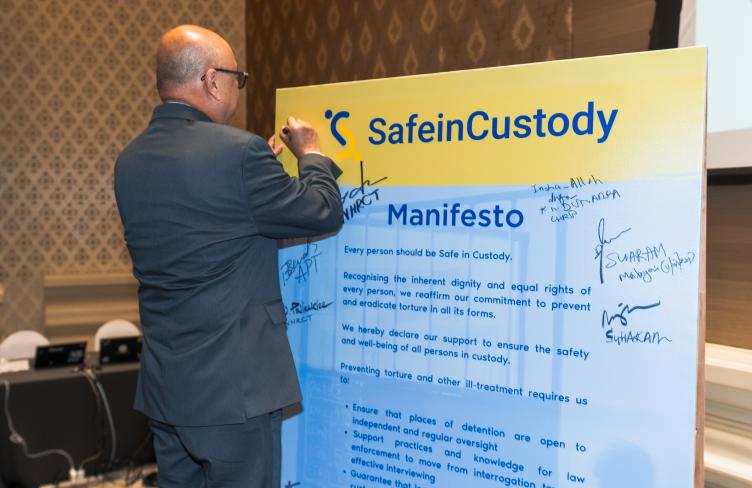
On the occasion of International Day in Support of Victims of Torture, a group of international experts* call for global support for the development of a set of guidelines on law enforcement practices, as a means to prevent torture around the world.
June 26, 2018 (Geneva/Washington DC/Oslo) – Around the world, we are repeatedly confronted with the reality that torture, particularly in the context of law enforcement interviews and during the first hours of custody, continues despite its absolute prohibition. Many victims are from marginalised communities. In the name of heightened security concerns and efforts to fight crime and terrorism, prohibited practices risk becoming normalised and increasingly widespread.
Today, on the occasion of the International Day in Support of Victims of Torture, we invite you to support the development of universal standards on how law enforcement should conduct non-coercive interviews and implement fundamental safeguards during investigations.
“The guidelines will be based on decades of scientific research and evidence that unequivocally demonstrates that torture and coercion do not work, and indeed that it produces false information,” explained Lilian Stein, Professor of Psychology at the Pontifícia Universidade Católica do Rio Grande do Sul, Porto Alegre, Brazil.
“Law enforcement officers often work in difficult environments, and do not receive adequate training--which can lead them to resort to torture or other coercive practices during interviews and investigations. The guidelines will be an essential means of providing much needed practical guidance to practitioners, and to changing practices on the ground,” said Asbjørn Rachlew, Norwegian police superintendent.
Encountering victims in our daily work, we know that the impact of torture is devastating not only to individual victims, but to societies as a whole, by weakening trust in public institutions, diluting the rule of law, and breeding more crimes and instability. “The development of the guidelines is essential to ensure State accountability, and will therefore contribute to eradicating torture,” emphasised Ruth Ssekindi, Director of the Complaints of the Investigations and Legal Services of the Uganda Human Rights Commission.
It is high time to make the absolute prohibition of torture a reality and to move away from confession-driven criminal justice systems. We call on the international community to come forward in broad coalition of support for the development of this set of guidelines. In doing so, we will come one step closer to collectively preventing the use of torture around the world, by reinforcing the absolute legal prohibition, conveying the reality that torture does not “work” in practice, and providing much needed practical guidance to law enforcement and authorities.
* The “Steering Committee” for the process to develop the set of guidelines for investigative interviewing and attendant legal safeguards is comprised of 15 experts working in the fields of law-enforcement, psychology and human rights: Ray Bull, Mark Fallon, Veronica Hinestroza, Juan E. Méndez, Zaza Namoradze, Gavin Oxburgh, Pau Perez-Sales, Asbjørn Rachlew, Therese Maria Rytter, Mary Schollum, Rebecca Shaeffer, Ruth Ssekindi, Lilian Stein, Sean Tait, and Mark Thomson.
The work of the Steering Committee is supported by a Coordination Group reflecting an institutional partnership between the Anti-Torture Initiative, the Association for the Prevention of Torture, and the Norwegian Center for Human Rights.


